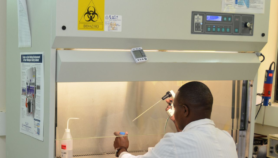By: Alex Abutu
Send to a friend
The details you provide on this page will not be used to send unsolicited email, and will not be sold to a 3rd party. See privacy policy.
[ABUJA, NIGERIA] Nigeria’s inability to turn research products into tangible developmental outcomes is hurting the country’s socioeconomic growth, a minister says.
Speaking during the launch of a set of guidelines capable of spurring uptake of research results for development, Ogbonnaya Onu, minister of science and technology for Nigeria, said that the guidelines aim to, among others, ensure originality, eliminate plagiarism and align research with national developmental agenda.
“Low quality of research and development results and inventions emanating from universities and research institutes, coupled with inefficient management of intellectual property assets, have been identified as [the] bane of low commercialisation of research results in Nigeria,” Onu said last month (26 July) during the launch.
“The challenges facing researchers in Nigerian universities go beyond guidelines for commercialisation.”
Achimugu Joseph, Kogi State University
The guideline is made up of seven chapters including on policy and strategies for commercialising research and development (R&D) results and inventions.
Most of the R&D results, he said, are lying idle in research institutions across the country because the process of commercialising research is very complex and requires capital and the skills and expertise of many professionals including economists.
But some Nigerian scientists have criticised the development, saying that what is required is adequate funding of research by the government and the private sector, which is lacking in the country. Scientists in the country have been clamouring for the allocation of at least one per cent of the country’s gross domestic products to R&D.
Achimugu Joseph, a researcher at the Department of Applied Chemistry, Kogi State University, says that translating research into products requires more than the launch of just a guideline.
“The challenges facing researchers in Nigerian universities go beyond guidelines for commercialisation. Researchers are not encouraged to research into issues that affect society such as energy, access to safe and clean water and waste management,” explains Joseph. “Most of the researches going on in the universities are funded by foreign donors and they are sponsored for a particular purpose.”
Amos Wando, a senior lecturer at the Department of Food Science and Technology, University of Agriculture, Makurdi, adds that most researchers in universities lack access to funding to undertake quality research.“We are in an era when researchers cannot get any support from [the] government to undertake any form of research. Government is not funding research. What use will the guideline be in the absence of research output from universities,” Wando poses.
This piece was produced by SciDev.Net’s Sub-Saharan Africa English desk.














